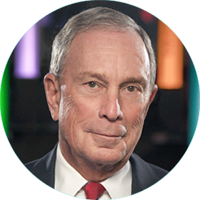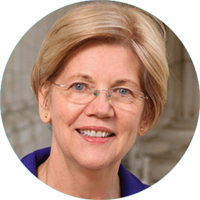The United States’ presidential election is in full swing, with eight Democratic contenders remaining in the race to take on President Donald Trump in November’s election. When it comes to Latin America, some issues, like immigration and Venezuela’s collapse, have already played a role in the campaign. Other issues, like the region’s fight against corruption, have been largely absent from the debate.
So how do the candidates view Latin America, and how will their policies reflect their approach? AQ asked every major candidate – including Trump – to answer a ten-question survey about how they would shape their Latin America policy if elected in November. We had just one caveat: Answers must be 50 words or less – about the length of a tweet.
So far, two candidates have responded: business mogul and former New York City Mayor Michael Bloomberg and Senator Elizabeth Warren. Their answers are below. AQ has asked other campaigns to submit and will post their responses if they do, with any additions noted at the end of the page.
Q1. What is the first Latin American country you would visit after the inauguration?
 |
Bloomberg: Mexico. The United States has a tremendous strategic advantage in having two neighbors, Mexico and Canada, who are not just major trading partners but also close and loyal allies. Our relationship with Mexico is crucial to America’s security, economy and our identity as a tolerant, multicultural society. |
 |
Warren: I have said that my first international trip as president will be to Central America. We share many mutual interests, and now more than ever we must move forward in a spirit of equal partnership and reaffirm that our shared ties are a source of strength, not weakness. |
Q2. Should the U.S. work to broker a regime change in Venezuela?
 |
Bloomberg: Venezuela is a case study in how despotism can lead a country to ruin – and destabilize an entire region in the process. The U.S. must remain steadfast in supporting the restoration of Venezuela’s democracy and democratic institutions under interim president Juan Guaidó. |
 |
Warren: Maduro is a dictator whose regime has dismantled democratic institutions – but fomenting regime change doesn’t benefit the Venezuelan people. Instead, we should work with regional partners to address Venezuela’s humanitarian needs, provide TPS to Venezuelans in the U.S., and advance negotiations for free, fair elections as quickly as possible. |
Q3. Should aid for Northern Triangle countries – El Salvador, Guatemala and Honduras – be contingent on their governments’ ability to stem U.S.-bound migration?
 |
Bloomberg: No. People are fleeing those countries because of violence and the lack of economic opportunity, and cutting aid – as President Trump has done – will only make those problems worse. I will restore aid and will also convene leaders in the hemisphere to develop plans to manage migration and resettlement. |
 |
Warren: No. It is counterproductive to interrupt assistance that addresses the root causes of migration. I’ll provide $1.5 billion annually to fund programs that target violence, reduce poverty, address corruption, and build institutional capacity throughout our hemisphere – and I’ll rally the international community to match those funds. |
Q4. Are you in favor of negotiating new free trade agreements with Latin American countries, such as Brazil?
 |
Bloomberg: Yes. Trade can be a win-win proposition for the U.S. and its partners, so long as rules and policies ensure the gains are real and widely shared. As president, I will support new trade agreements with Latin American countries that include stronger labor and environmental standards and corruption-fighting commitments. |
 |
Warren: Being a good economic partner to Latin America will be a priority of my presidency. My trade policies aim to raise labor and environmental standards worldwide and bring down the price of drugs – helping Americans and working people in other countries too. |
Q5. How would you ensure credible commitments to fighting corruption from Latin America’s private and public sectors?
 |
Bloomberg: I will insist on and work to pass modern high-standard new trade agreements that require commitments to fight corruption, especially in public contracting and customs rules, and that includes effective enforcement mechanisms and penalties. |
 |
Warren: Trump has undermined anti-corruption efforts in the region. I will invest in building anti-corruption capacity and combating the dark money that fuels autocracy and corruption worldwide. Ending corruption will be the centerpiece of my administration, and I have detailed plans for how we will do this at home and abroad. |
Q6. Is China’s growing influence in Latin America a threat to U.S. national security?
 |
Bloomberg: Some of China’s activities in Latin America are very concerning, including some of its lending practices and its support for autocratic governments. President Trump talks tough on China, but has largely ignored its growing influence in Latin America. That will change in a Bloomberg presidency. |
 |
Warren: China’s unfair use of its economic might is a matter of concern globally, but a strong relationship with Latin America is in our interest regardless of China’s actions. Trump has alienated our regional partners. I’ll re-establish our credibility as a partner in the Americas, starting with respect and common courtesy. |
Q7. Do you think a move by Latin American governments to legalize marijuana or other drugs would undermine U.S. interests?
 |
Bloomberg: I will work with our partners to combat all illicit trade – including marijuana and other drugs smuggled into the U.S. No one should be arrested for possessing a small amount of marijuana. Possession of small amounts should be decriminalized. And I won’t interfere with states that have legalized it. |
 |
Warren: No. The “War on Drugs” has criminalized addiction, destabilized the region, and failed to significantly curb violent effects of the drug trade. It has not made us safer. I support the legalization of marijuana. It’s time for a new approach that emphasizes evidence-based treatment while reducing and preventing criminal violence. |
Q8. Should the U.S. take action against Brazil if it fails to protect the Amazon rainforest?
 |
Bloomberg: The burning of the Amazon rainforest is a tragic setback for the planet. I will hold governments and corporations accountable for deforestation and other practices that increase climate change and threaten indigenous peoples. Pope Francis’ global call for action and his Querida Amazonia message on this crisis were especially inspiring. |
 |
Warren: The Amazon rainforest is widely considered the lungs of our planet, and it demands both Brazilian and multilateral efforts to protect it. We need Brazil to lead, as it has done in the past. Defeating the climate crisis will be an organizing principle of a Warren administration’s foreign policy. |
Q9. What is your vision for relations between the U.S. and Cuba?
 |
Bloomberg: Until Cuba improves its human-rights record and stops its destabilizing international behavior, U.S. sanctions should remain in place. But restrictions on U.S. citizens’ travel to Cuba should be lifted and people-to-people exchanges encouraged. The best way to promote democracy is through openness, cultural exchange, and exposure to democratic values. |
 |
Warren: I’ll reverse Trump’s counterproductive policies, which harm the Cuban people more than its leaders. Instead we must create opportunities for Cubans to live better lives, lift restrictions on travel and remittances, and permit families to reunite. The best way to promote change is by empowering the Cuban people, not punishing them. |
Q10. In the 20th century, the U.S. supported coups in countries including Brazil, Chile and Guatemala. As president, would you consider officially apologizing for such past actions?
 |
Bloomberg: America’s record in Latin America over the past 200 years has seen victories and mistakes. We can’t change the past, but we can commit to building a better future through strong cooperation. After Trump’s neglect, I will make improving relations and trade with Latin America a priority. |
 |
Warren: I’ll acknowledge the mistakes of the past, including our difficult history of intervention in the region. But we cannot be trapped by them – the stakes are too high. Moving forward, we must come together as partners to defend democracy and the freedoms so many in the region fought to win. |
Update: On Feb. 19 Bloomberg expanded his answer for question #7 to include the second two sentences and remain within the 50 word limit.








